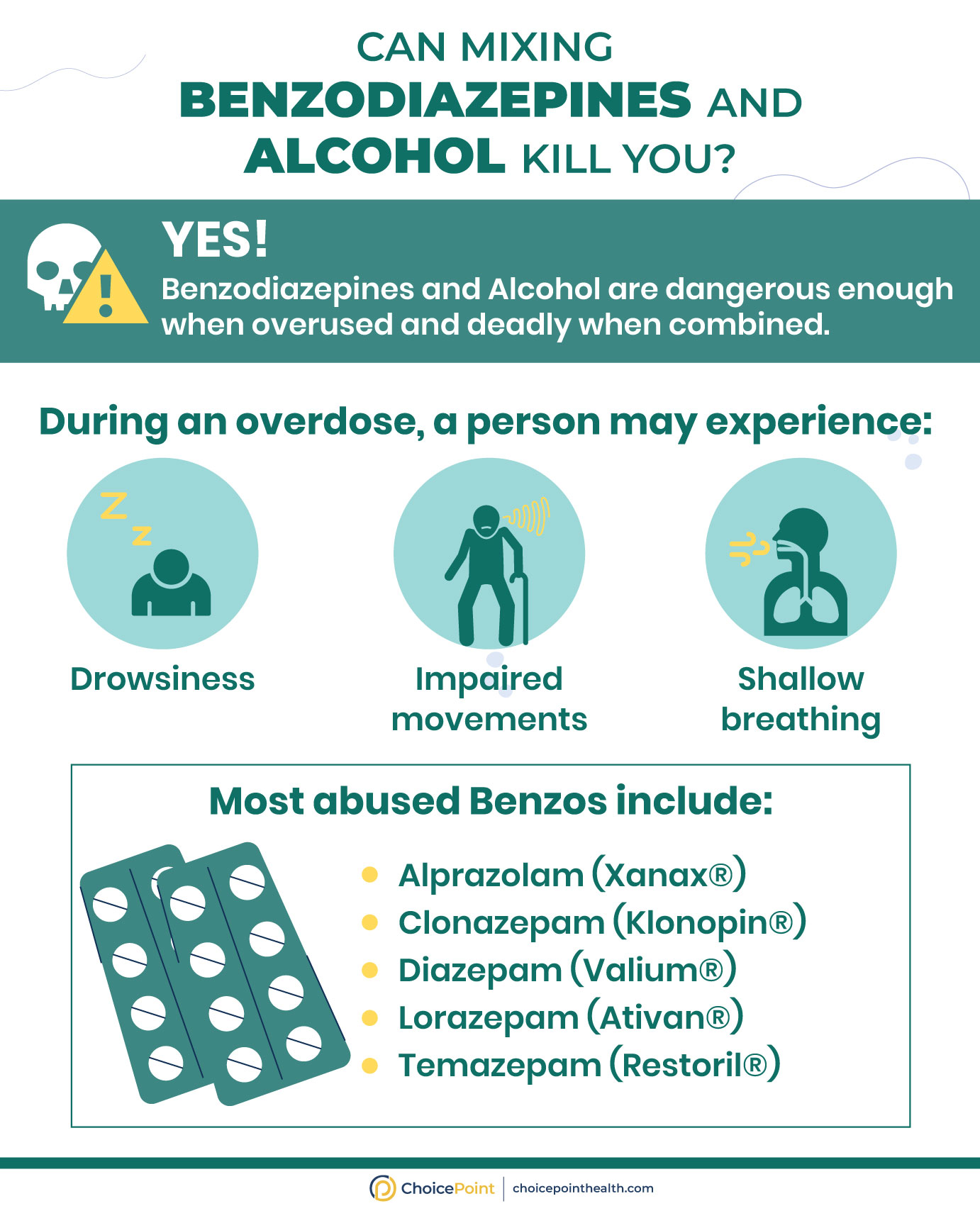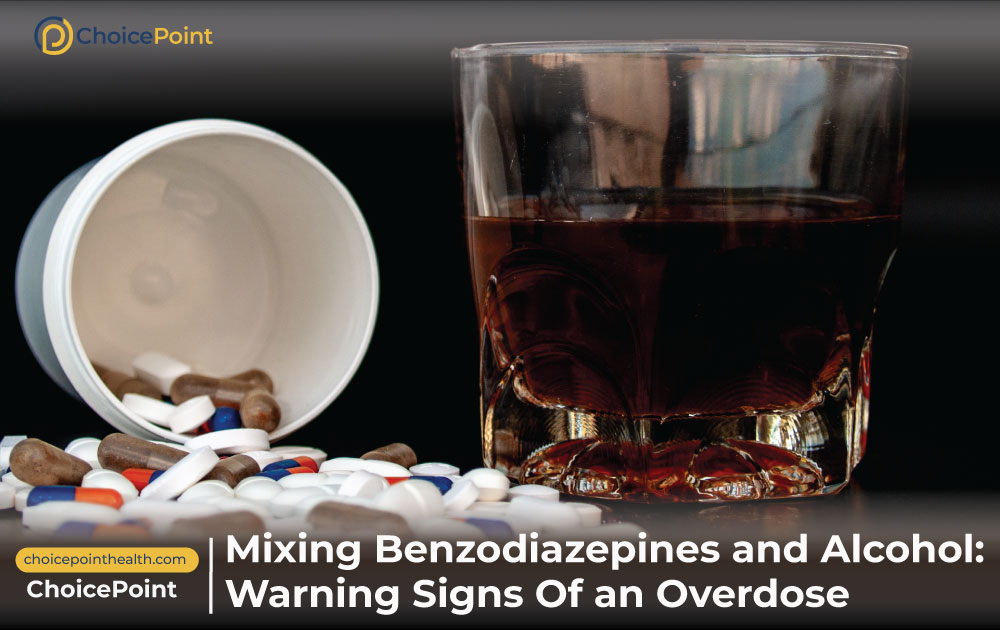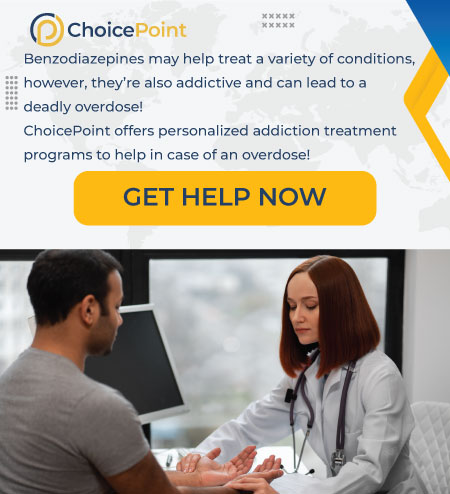Did you know that between 2019 and 202, benzodiazepines were implicated in 12,499 overdose fatalities in the United States? Benzodiazepines (benzos) are excellent drugs for treating numerous diseases. However, their addictive nature increases the risk of a potentially lethal overdose. They carry the danger of misuse, addiction, and deadly overdose. Especially when mixed with opioids, alcohol, and a variety of other illicit or prescribed medicines. In this article, we will discuss how mixing Benzodiazepines and Alcohol may result in an overdose, its warning signs, and how one may prevent it.
Call 844.445.2563 and begin your recovery journey with ChoicePoint’s DEA-certified practitioners today!
Table of Contents
What are Benzodiazepines, and What is Their Role in Healthcare
Benzodiazepines, or “benzos,” are a class of drugs used to treat anxiety, sleeplessness, and seizures. They act by increasing the effects of gamma-aminobutyric acid (GABA), a neurotransmitter in the brain that helps to relax the nervous system. These drugs are known for their sedative and relaxing properties. However, they also carry the danger of overuse, dependence, and overdose.
A list of commonly prescribed Benzodiazepines includes:
- Alprazolam (Xanax)
- Diazepam (Valium)
- Lorazepam (Ativan)
- Clonazepam (Klonopin)
- Temazepam (Restoril)
- Chlordiazepoxide (Librium®)
- Oxazepam (Serax)
- Clorazepate (Tranxene)
- Triazolam (Halcion)
- Estazolam (ProSom)
A healthcare provider may prescribe Benzodiazepines or Benzos for the following:
- Anxiety disorders
- Panic attacks
- Insomnia
- Seizures
- Muscle spasms
- Alcohol Withdrawal
- Sedation
While Benzodiazepines may be effective for these conditions, they also have hazards, particularly including tolerance, dependency, and withdrawal. Consequently, doctors often briefly give them the lowest dose to reduce these dangers.

Did you know? that Benzodiazepine misuse is even more prevalent among individuals seeking treatment for Alcohol Use Disorder (AUD) compared to the general population?

Did you know? that Benzodiazepine misuse is even more prevalent among individuals seeking treatment for Alcohol Use Disorder (AUD) compared to the general population?
Mixing Benzos and Alcohol: A Recipe for an Overdose
Mixing benzodiazepines and alcohol is a dangerous combination due to their synergistic effects on the central nervous system. Both alcohol and benzodiazepines are CNS depressants. Therefore, when both substances are combined, their effects are magnified, and they depress the activity of the brain, leading to an overdose. Common overdose symptoms caused by mixing Benzodiazepines and Alcohol may include:
- Slurred speech that is difficult to understand
- Confusion or disorientation to comprehend one’s environment.
- Feeling excessively fatigued to the point of dozing off.
- Difficulty walking steadily, appearing off balance or staggered.
- Severe sedation and unresponsiveness.
- Difficulty waking up or passing out.
- Visual impairment, seeing double, or difficulty focusing.
- Sluggish or shallow breathing patterns.
This list is incomplete; contacting a healthcare professional and seeking urgent assistance is important. ChoicePoint is proud to have exceptional and efficient DEA-certified practitioners. For more information, call 844.445.2563 now!
Why Do People Mix Benzodiazepines and Alcohol?
As doctors prescribe Benzodiazepines, there is a common misperception that they are safe to consume, particularly in comparison to illicit substances. Here are some reasons why people may mix Benzodiazepine with Alcohol:
- Many people may be unaware of the hazards associated with combining alcohol and benzodiazepines.
- As a result, people may casually take Valium or Xanax for social anxiety at an event where alcohol is present.
- Some people may mix Alcohol and Benzodiazepines to enhance the euphoric and soothing effects of both.
Remember, this combination increases the risks of misusing either substance and potentially leading to deadly overdoses.
Overdose Emergency: Steps For Assisting A Loved One In Crisis
If you are ever in a situation where a loved one is experiencing an overdose due to mixing Benzodiazepines and Alcohol, then here are some tips:
- Remember that a Benzo overdose is an emergency, so instantly dial 911 or your local emergency number right away.
- Check for responsiveness and signs of breathing.
- Is the person not breathing? Perform rescue breathing. Tilt their head back, lift their chin, and give two breaths every 5 seconds.
- If they are breathing but unconscious, lay them on their side in the recovery position to prevent choking on vomit.
- Comfort the person and assure them that you are here to help.
An overdose may seem extremely different from person to person. Therefore, don’t hesitate to call for help if somebody is acting strangely. Even if the symptoms appear mild, the individual may require medical attention to avoid major problems from benzo abuse. ChoicePoint offers an alcohol abuse hotline; call now at 844.445.2563 and get help for yourself or a loved one in need!

The Danger of Combining & Mixing Alcohol and Benzos
How Long After Taking a Benzo Is it Advisable to Drink Alcohol?
The time between taking a benzo and drinking alcohol varies depending on the exact benzo. It is critical to wait until a benzodiazepine has cleared the system before consuming any alcohol. This will reduce the danger of combining the two medications. Here is a brief overview of how much you should wait after each Benzo:
- Xanax (Alprazolam)-24 hours
- Valium (Diazepam)-24 to 48 hours
- Ativan (Lorazepam)-24 to 48 hours
- Klonopin (Clonazepam)-24 to 48 hours
- Librium® (Chlordiazepoxide)-24 to 48 hours
The wait time allows the medication to clear from the system. It may also reduce the risk of any side effects of Benzodiazepines. The amount of time it may take Benzodiazepine to leave your system varies on each drug. It is better to consult your healthcare provider for any assistance.
Please note this assessment is an initial self-screening, and it is not meant to be a medical assessment or clinical diagnosis of addiction. For proper diagnosis and treatment, schedule an appointment with ChoicePoint.
Treatment for Benzodiazepines and Alcohol Misuse
Are you unable to stop yourself from mixing Benzos with Alcohol? Are you looking for a way out and seeking help? Read and find out how seeking help from a co-occurring addiction rehab may help you with addiction:
1. A Medical Detox
The first step is a medically supervised detoxification process. It is particularly for people who have developed a dangerous physical reliance on benzodiazepines or alcohol. This approach gradually tapers off the substances under medical supervision to reduce withdrawal symptoms.
2. Medication-Assisted Treatment (MAT)
FDA-approved medication, along with professional counseling, may be used to alleviate withdrawal symptoms and cravings. For individuals who suffer from an overdose by mixing benzodiazepines and alcohol, a gradual tapering schedule with medications may be helpful. Medications that may be used include:
- diazepam (Valium)
- clonazepam (Klonopin)
To lower cravings and avoid relapse with alcohol, the following medications may be used:
3. Therapy and Counseling
Personal therapy sessions with patients are helpful in many ways. Behavioral therapies (CBT, DBT) are essential components of addiction treatment. These therapies may assist patients in:
- understanding the underlying causes of their substance use
- developing coping mechanisms
- changing drug and alcohol-related behaviors
4. Dual Diagnosis Treatment for Co-occurring Disorders
Many individuals with benzodiazepine and alcohol misuse also develop co-occurring mental health disorders at some point. Common co-occurring disorders may include:
- Anxiety
- Depression
- PTSD
- Bipolar disorder
- OCD
Integrated treatment that addresses both substance use and mental health issues simultaneously is often more effective because:
- Without treating mental illness, physical recovery may not be possible, and vice versa
- By addressing mental health and substance abuse, individuals may experience greater stability and long-term sobriety
- Dual Diagnosis may equip individuals with the tools and skills needed to prevent relapse
- Individuals may receive holistic care
5. Aftercare and Ongoing Support for Prolonged Recovery
Aftercare services from an addiction treatment rehab are crucial for long-term success because recovery is an ongoing process. This may include:
- Continued therapy sessions and counseling
- Regular check-ins with healthcare providers
- Involvement in support groups
Get Help At ChoicePoint
Have you decided to seek help for yourself or a loved one? ChoicePoint offers personalized addiction treatment for Veterans, Criminals, students, and Expecting Mothers. Our levels of care include:
- Medical Detoxification
- Inpatient Rehabilitation
- High-intensity Outpatient (HIOP/PHP)
- Intensive Outpatient Program (IOP)
- Outpatient Treatment
- Aftercare and Continuing Support
- Medication Assisted Program (MAT)
Call us now at 844.445.2563!
Commonly Asked Questions About Mixing Benzodiazepines and Alcohol
People ask the following common questions about Benzodiazepines and Alcohol.
Can You Consume Alcohol When On Benzodiazepines?
People are strongly advised against combining alcohol and benzodiazepines. The reason is the increased risk of side effects. Alcohol can enhance the sedative effects of benzodiazepines, resulting in unsafe levels of sleepiness, poor coordination, and respiratory depression.
Can Mixing Benzodiazepines And Alcohol Result In An Overdose?
Yes, absolutely! Combining benzodiazepines with alcohol dramatically raises the risk of overdose. Both drugs depress the central nervous system, and their combined effects can result in respiratory failure, heart problems, and overdose death.
Is Occasional Use Of Alcohol With Benzodiazepines Safe?
Not at all! No amount of alcohol is considered safe when taking benzodiazepines. Therefore, even occasional use can result in dangerous interactions and adverse effects. It is best to avoid alcohol entirely while using benzodiazepines.
Can I Drink Alcohol After Stopping Benzodiazepine Treatment?
You may ask your healthcare provider before doing so. Moreover, it is generally advised to wait a significant amount of time after stopping benzodiazepine treatment before consuming alcohol. This allows the body to fully clear the medication from the system to prevent lingering interactions or effects.
What Should Be Avoided When Taking Benzodiazepines?
Combining benzodiazepines with alcohol or other sedatives can lead to dangerous sedation and respiratory depression. To clarify, here is a list of things that should be avoided while taking Benzos.
- Opioids
- Sleep medication
- Grapefruit juice
- Alcohol
Medical Disclaimer:
ChoicePoint aims to improve the quality of life for people struggling with substance use disorder and mental health issues. Our team of licensed medical professionals research, edit and review the content before publishing. However, this information is not intended to be a substitute for professional medical advice, diagnosis, or treatment. For medical advice please consult your physicians or ChoicePoint's qualified staff.











Review Mixing Benzodiazepines and Alcohol: Overdose Warning Signs.